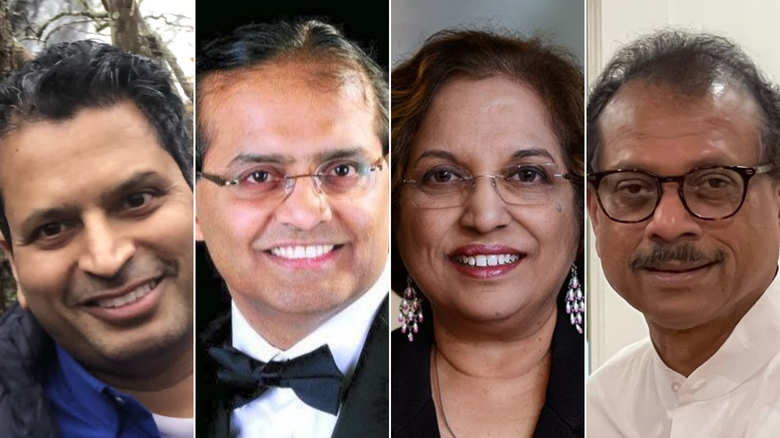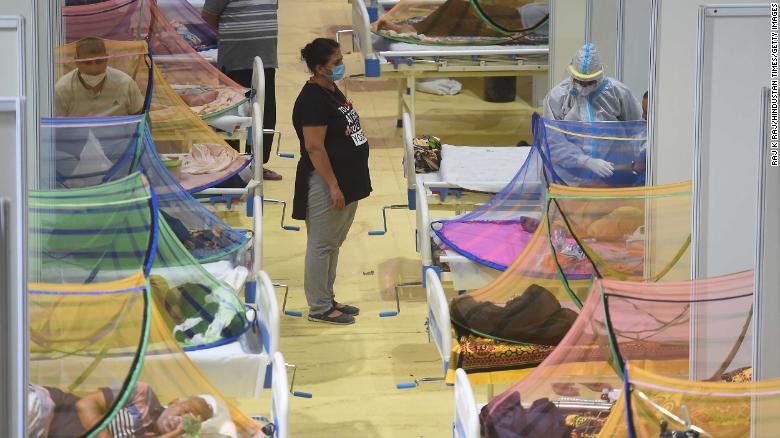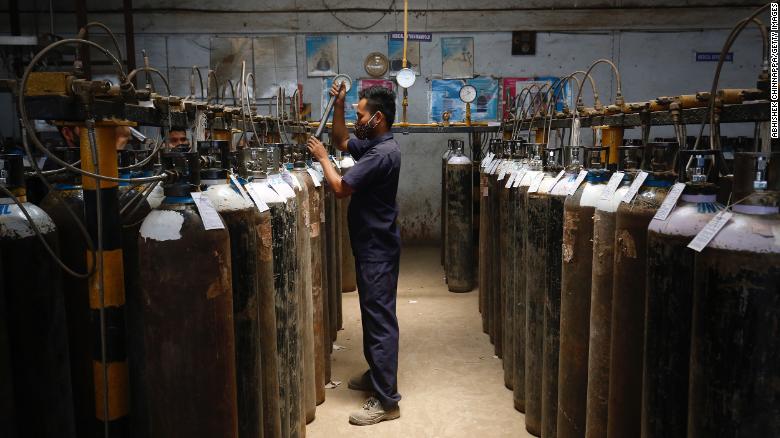(CNN)As the coronavirus crisis in India spirals out of control and its health care system crumbles, the Indian diaspora in the US is pitching in to help. Sitting thousands of miles away, unable to be there physically to help and feeling the grief and desperation of their loved ones back home, Indian American doctors provided friends and family with medical advice over phone and video calls.
But as the avalanche of Covid-19 deaths and cases continues to cripple the health care system during the second wave, the doctors are going beyond helping just family and friends. Some of them are now staying up nights, when it is daytime in India, to advise other coronavirus patients and raise money for medical supplies.
"I didn't have to pay for my five years of medical school education in India, except for student union fees. So we all feel like we owe it to India. Some poor farmer must have paid taxes for us to go to medical school free. I have always felt I owe something back ... and I think most of them see it that way," said Dr. Kalpalatha Guntupalli of Baylor College of Medicine.
India has been recently reporting more than 400,000 Covid-19 cases daily and at least 4,000 deaths. And with oxygen, medical necessities and vaccines in short supply, the principal scientific adviser to the Indian government, K. VijayRaghavan, is warning that a third wave of the Covid-19 pandemic is "inevitable" in India.
"A phase three is inevitable, given the higher levels of circulating virus, but it is not clear on what time scale this phase three will occur," VijayRaghavan said at a news conference, asking authorities to be prepared for new waves.
CNN spoke to some doctors who are helping coronavirus patients in India from afar. Here are some of their stories.
Helping out friends and family
Dr. Prasad Garimella's 48-year-old younger brother died of coronavirus in India. Emotional when speaking about him, Garimella said his brother was the anchor of the whole family, and said other family members are also sick with Covid-19. And although he's sitting far from them in Georgia, he jumped in to help by advising them over the phone.
"In fact, I deal with this on a daily basis and have a standard format that I have made. So depending on what stage or what phase they are in, I can give them the right advice," he said.
A pulmonologist with the Gwinnett Pulmonary Group, Garimella specializes in treating patients with lung issues. For the patients he's helping in India, he asks them to fill out a simple template that includes basic information such as vital signs, oxygen symptoms, CT scans, lab results and underlying health conditions, which they send him via WhatsApp.
But it's not just his friends and family that he's treating. He and other doctors are working together to try to help any Covid-19 patient in India who reaches out for help.
Dr. Sreeni Gangasani's family, including his parents and brother in India, all contracted Covid-19, yet he was able to help them via Whatsapp and video calls so that they were able to manage their symptoms at home and did not have to go to the hospital. He says that is when he decided, "Why not help more people by just using our resources here?"
The chairman and co-founder of
eGlobalDoctors, Gangasani was building the for-profit medical platform providing telehealth consultations. He was planning to launch the platform, which was still in a beta-testing phase, later this summer when the alarming Covid-19 surge started sweeping through India.
That's when he and other doctors such as Garimella decided to provide free medical advice for Indian patients with Covid-19 via the website, partnering with the
American Association of Physicians of Indian Origin (AAPI) and the
non-profit Sewa International to provide this service.
Inundated with Covid-19 patients
To get medical advice, coronavirus patients in India must fill out an online form, after which they are connected by volunteers via Zoom to a doctor in the US. The patients can also select their preferred language and are matched with a doctor accordingly. Volunteers also try to have the patient see the same doctor when they return for follow-up visits.
The doctors usually begin advising patients around 8:30 p.m. ET after they're back from their regular jobs. Because of the time differences between the US and India, the doctors are joined through the night by others from Central and Pacific time zones, administering the clinic until about 1:30 a.m. ET. The doctors say the purpose of the clinic is to relieve the burden felt by emergency rooms in India.
They started only a week ago but have already been inundated with calls from hundreds of Covid-19 patients from India.
"Our goal is twofold. One is to provide the physicians in India who are really working so hard for so many months get a break. The second purpose is to identify the sick patients from the non-sick patients," Gangasani said. He said a lot of the patients are anxious because they are isolated, and when they have mild symptoms they rush to the hospital.
"So if you can identify that they have mild symptoms and can stay home and take Tylenol, you tell them to do so," he said. He then advises them on other serious symptoms to monitor and to go to the hospital if necessary.
Gangasani said on average, about 200 people fill out the online form each day, but about 100 actually show up to speak with the doctor. He said all the doctors and volunteers are working pro bono for the India crisis.
Donations are flooding in
Dr. Sudhakar Jonnalagadda, president of AAPI, said they are planning to send more oxygen concentrators, ventilators, remdesivir and personal protective equipment to India. He said donations flooded in after he sent out a call for help, and they raised a few million dollars in less than two weeks.
Jonnalagadda added that the oxygen concentrators and other medical supplies they are sending to India are being distributed with the help of Sewa International.
"It's not just the money, but how well we can convert it into lives is the most important thing. So if equipment is what they need, you need to convert that money into lifesaving equipment," Garimella said. He added that the initial target was $50,000; they reached that amount in just a few hours.
Dr. Guntapalli said at least 15 people in her extended family got Covid-19 in India and she is giving medical advice to family and friends there every day. "Things are getting close to home in this second surge," she said.
She added that oxygen concentrators will help one person at a time, so she is advising hospitals to add oxygen generation plants.
"I'm pretty convinced that this is not over yet. So I think oxygen generating plants at hospitals would be one more or less permanent solution that can last for many years. And there's no transportation issues. So I think we have to think both short-term, what they need now, and somewhat of a semi-permanent solution as well," she said.
But all the doctors say they are hopeful things will get better in India soon.
"Hopefully this doesn't last too long. Hopefully in one to two months, India will recover enough for doctors to take care of their own patients. So during that time I think we want to do as much as we can," Gangasani said.
If you would like to help those in India suffering during the Covid-19 crisis, go to
cnn.com/impact
to find ways in which you can help.


